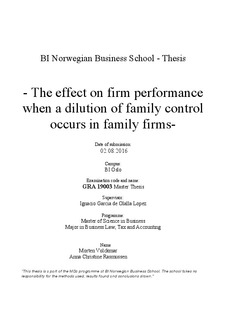The effect on firm performance when a dilution of family control occurs in family firms
Master thesis
Permanent lenke
http://hdl.handle.net/11250/2443695Utgivelsesdato
2016Metadata
Vis full innførselSamlinger
- Master of Science [1621]
Sammendrag
This paper investigates how Norwegian family firm’s performance is affected by a
dilution of family ownership control. Family firms hold unique firm
characteristics and we explore if these characteristics change together with
ownership dilution, and can be possible reasons for a change in firm performance
for the firms that go through a family ownership dilution. Lastly we study how
family ownership affect the firm’s survival. We have used data from 2000-2013
gathered from the Centre of Corporate Governance Research. Our findings show
that the family firms that go through a family ownership dilution have lower firm
performance than the family firms that remain family control over the firm during
the whole time period. The typical characteristics of having a family member
CEO, small size of the firm, few owners and higher asset turnover (ATO) are
found to have positive impact on firm performance. No support was found for that
an increased debt-to-equity was associated with lower firm performance, and there
is not enough evidence to say whether the difference in long-term debt ratio had
an impact on return on assets (ROA). However, the firms that dilute family
control are found to have higher probability to survive longer. Our results are
considered overall robust to alternative definitions and measurements.
Beskrivelse
Masteroppgave(MSc) in Master of Science in Business, Business law, tax and accounting - Handelshøyskolen BI, 2016
